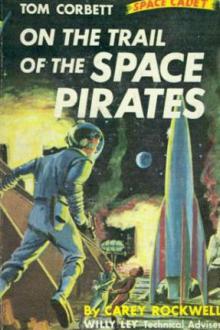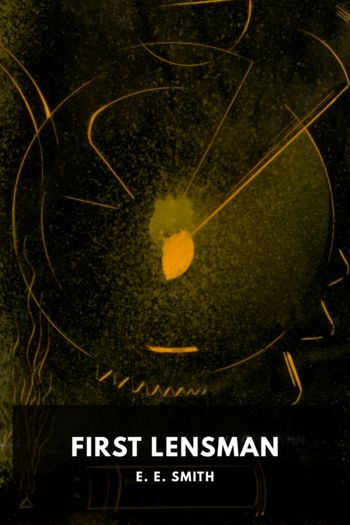Triplanetary - E. E. Smith (phonics reader TXT) 📗

- Author: E. E. Smith
Book online «Triplanetary - E. E. Smith (phonics reader TXT) 📗». Author E. E. Smith
“The secret of eternal youth!” gasped Baxter, awed in spite of himself.
“Right, and he stayed Chief Devil, in spite of all the efforts of all his ambitious sub-devils to kill him, until the turning-point of the First Jovian War. He cut away then in a spaceship, and ever since then he has been working—and working hard—on some stupendous plan of his own that nobody else has ever got even an inkling of. That’s the story. True or not, it explains a lot of things that no other theory can touch. And now I think you’d better shuffle along; enough of this is a great plenty!”
Baxter went to his own cubby, and each man of Gray Roger’s cold-blooded crew methodically took up his task. True to prediction, in five days a planet loomed beneath them and their vessel settled through a reeking atmosphere toward a rocky and forbidding plain. Then for hours they plunged along, a few thousand feet above the surface of that strange world, while Roger with his analytical detectors sought the most favorable location from which to wrest the materials necessary for his program of construction.
It was a world of cold; its sun was distant, pale, and wan. It had monstrous forms of vegetation, of which each branch and member writhed and fought with a grotesque and horrible individual activity. Ever and anon a struggling part broke from its parent plant and darted away in independent existence; leaping upon and consuming or being consumed by a fellow creature equally monstrous. This flora was of a uniform color, a lurid, sickly yellow. In form some of it was fern-like, some cactus-like, some vaguely tree-like; but it was all outrageous, inherently repulsive to all Solarian senses. And no less hideous were the animal-like forms of life which slithered and slunk rapaciously through that fantastic pseudo-vegetation. Snake-like, reptile-like, bat-like, the creatures squirmed, crawled, and flew; each covered with a dankly oozing yellow hide and each motivated by twin common impulses—to kill and insatiably and indiscriminately to devour. Over this reeking wilderness Roger drove his vessel, untouched by its disgusting, its appalling ferocity and horror.
“There should be intelligence, of a kind,” he mused, and swept the surface of the planet with an exploring beam. “Ah, yes, there is a city, of sorts,” and in a few minutes the outlaws were looking down upon a metal-walled city of roundly conical buildings.
Inside these structures and between and around them there scuttled formless blobs of matter, one of which Roger brought up into his vessel by means of a tractor. Held immovable by the beam it lay upon the floor, a strangely extensile, amoeba-like, metal-studded mass of leathery substance. Of eyes, ears, limbs, or organs it apparently had none, yet it radiated an intensely hostile aura; a mental effluvium concentrated of rage and of hatred.
“Apparently the ruling intelligence of the planet,” Roger commented. “Such creatures are useless to us; we can build machines in half the time that would be required for their subjugation and training. Still, it should not be permitted to carry back what it may have learned of us.” As he spoke the adept threw the peculiar being out into the air and dispassionately rayed it out of existence.
“That thing reminds me of a man I used to know, back in Penobscot.” Penrose was as coldly callous as his unfeeling master. “The evenest-tempered man in town—mad all the time!”
Eventually Roger found a location which satisfied his requirements of raw materials, and made a landing upon that unfriendly soil. Sweeping beams denuded a great circle of life, and into that circle leaped robots. Robots requiring neither rest nor food, but only lubricants and power; robots insensible alike to that bitter cold and to that noxious atmosphere.
But the outlaws were not to win a foothold upon that inimical planet easily, nor were they to hold it without effort. Through the weird vegetation of the circle’s bare edge there scuttled and poured along a horde of the metal-studded men—if “men” they might be called—who, ferocity incarnate, rushed the robot line. Mowed down by hundreds, still they came on; willing, it seemed to spend any number of lives in order that one living creature might once touch a robot with one outthrust metallic stud. Whenever that happened there was a flash of lightning, the heavy smoke of burning insulation, grease, and metal, and the robot went down out of control. Recalling his remaining automatons, Roger sent out a shielding screen, against which the defenders of their planet raged in impotent fury. For days they hurled themselves and their every force against that impenetrable barrier, then withdrew: temporarily stopped, but by no means acknowledging defeat.
Then while Roger and his cohorts directed affairs from within their comfortable and now sufficiently roomy vessel, there came into being around it an industrial city of metal peopled by metallic and insensate mechanisms. Mines were sunk, furnaces were blown in, smelters belched forth into the already unbearable air their sulphurous fumes, rolling mills and machine shops were built and were equipped; and as fast as new enterprises were completed additional robots were ready to man them. In record time the heavy work of





Comments (0)